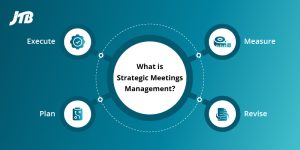Corporate event planning is the backbone of successful gatherings within companies, serving various purposes such as networking, training, team building, and celebrations. These organised events bring employees, clients, and stakeholders together, fostering connections and driving organisational objectives forward.
At the heart of every corporate event lies the significance of attendee engagement. Engaged participants actively contribute to the event’s success, enriching the experience for themselves and others. Their involvement enhances networking opportunities, promotes knowledge sharing, and reinforces the event’s purpose, ultimately leading to greater satisfaction and value derived from the event.
Enter Strategic Meetings Management (SMM), a methodology designed to optimise corporate event planning and management processes. SMM emphasises strategic planning, cost management, risk mitigation, and attendee satisfaction. By implementing SMM practices, organisations can ensure that their corporate events are meticulously planned, efficiently executed, and tailored to meet the needs and expectations of attendees.
In this blog, we delve into the critical role of attendee engagement in corporate events and how Strategic Meetings Management can elevate the planning and execution of these gatherings. Join us as we explore strategies, best practices, and real-world examples to maximise engagement and success in corporate event engagement activities.
Understanding Strategic Meetings Management
Strategic Meetings Management (SMM) is a comprehensive approach to managing corporate events and meetings strategically to achieve organisational objectives efficiently and effectively. It involves proactive planning, meticulous execution, and continuous evaluation to ensure successful outcomes.
The key components of SMM form the foundation of its methodology. These components include strategic planning, centralised management, supplier optimization, attendee management, and performance measurement. Each component plays a crucial role in the overall success of SMM initiatives.
The objectives of SMM are clearly defined to align with organisational goals. These objectives typically include cost savings, risk mitigation, compliance, and attendee satisfaction. By focusing on these objectives, organisations can achieve greater efficiency and effectiveness in their meeting and event planning processes.
Incorporating SMM into corporate event strategies offers numerous benefits. It leads to improved efficiency by streamlining processes and reducing inefficiencies. Cost savings are achieved through better negotiation with suppliers and optimised spending. Risk reduction is another significant benefit, as SMM helps identify and mitigate potential risks associated with meetings and events.
Furthermore, SMM enhances attendee experiences by ensuring that events are well-planned, organised, and tailored to meet their needs and expectations. This results in greater overall event success and contributes to the achievement of organisational objectives.
Importance of Engagement in Corporate Events
Engagement is crucial for the success of corporate events as it directly impacts the overall experience and outcomes. Engaged attendees are more likely to be attentive, participative, and satisfied, leading to better event outcomes. When participants are actively engaged, they contribute positively to discussions, activities, and networking opportunities, resulting in a more dynamic and enriching event experience.
The impact of engaged attendees on event outcomes and organisational goals cannot be overstated. Increased productivity, collaboration, and brand advocacy are just some of the benefits that stem from heightened engagement. Engaged participants are more likely to absorb information, exchange ideas, and form meaningful connections, which can ultimately drive business objectives forward.
Memorable corporate events are often characterised by high levels of attendee engagement. Interactive activities, networking opportunities, and personalised experiences play a key role in fostering corporate event engagement activities and creating a positive event atmosphere. For example, team-building exercises, breakout sessions, and live polls encourage active participation and foster a sense of camaraderie among attendees.
By prioritising corporate event engagement activities in corporate events, organisations can create impactful experiences that leave a lasting impression on participants. These events not only fulfill their intended purpose but also contribute to overall organisational success by fostering collaboration, innovation, and brand loyalty.
Leveraging SMM for Corporate Event Engagement Activities
Strategic Meetings Management offers a powerful framework for enhancing engagement in corporate events. By strategically integrating SMM principles into corporate event planning and management processes, organisations can create memorable and impactful experiences for attendees.
1. Setting Clear Objectives
One of the key strategies for leveraging SMM in corporate events is setting clear objectives. This involves defining the purpose of the event, identifying specific goals, and outlining desired outcomes. Clear objectives provide a roadmap for planning and execution, ensuring that every aspect of the event is aligned with the overarching goals.
2. Aligning Event Goals with Organisational Objectives
Integrating SMM into event planning also involves aligning event goals with organisational objectives. This ensures that corporate events are not only engaging but also contribute to broader business objectives such as sales targets, customer retention, or employee engagement. By aligning event goals with organisational goals, companies can maximise the impact of their events and drive tangible results.
3. Using Data-Driven Insights
Data-driven insights play a crucial role in leveraging SMM for engaging corporate events. By collecting and analysing relevant data, such as attendee feedback, event metrics, and post-event surveys, organisations can gain valuable insights into attendee preferences, behaviour patterns and satisfaction levels. This data can inform decision-making processes and help optimise future events for better engagement and success.
4. Harnessing Technology
Technology is a powerful tool for enhancing engagement in corporate events. From event management software to mobile apps and virtual reality experiences, technology offers innovative solutions for creating interactive and immersive event experiences. By harnessing the latest technological advancements, organisations can captivate attendees’ attention, facilitate networking opportunities and deliver personalised content tailored to individual preferences.
5. Implementing Interactive Activities
Interactive activities are another effective way to foster engagement in corporate events. From live polls and Q&A sessions to gamification elements and interactive workshops, incorporating interactive activities encourages active participation and stimulates meaningful interactions among attendees.
By providing opportunities for hands-on learning and collaborative problem-solving, interactive activities create memorable experiences that leave a lasting impression.
6. Emphasising Personalised Experiences
Personalisation is key to engaging attendees in corporate events. By tailoring content, agendas, and experiences to the unique needs and interests of attendees, organisations can create personalised experiences that resonate on a deeper level. Whether through personalised networking opportunities, customised agendas, or targeted communications, emphasising personalised experiences demonstrates a commitment to attendee satisfaction and engagement.
Leveraging SMM for engaging corporate events involves setting clear objectives, aligning event goals with organisational objectives, using data-driven insights, harnessing technology, implementing interactive activities, and emphasising personalised experiences. By adopting these strategies and best practices, organisations can create memorable and impactful events that drive engagement, foster connections, and deliver tangible business results.
Conclusion
We’ve delved into the critical link between attendee engagement and SMM within corporate event planning. Active participant involvement is paramount, as engaged attendees contribute positively and derive value from the experience. Integrating SMM into your corporate event engagement activities is key, offering a robust framework for optimising planning and management processes, leading to heightened engagement and overall event success.
By embracing SMM principles, you can streamline operations, mitigate risks, and prioritize attendee satisfaction, ultimately yielding superior outcomes for your corporate events. As you conclude your reading, take the next step in your event-planning journey by exploring the strategic meetings management solutions offered by JTB India.
Our tailored solutions are designed to assist you in effectively implementing SMM practices, ensuring that your corporate events are not only successful and engaging but also closely aligned with your strategic objectives.






















